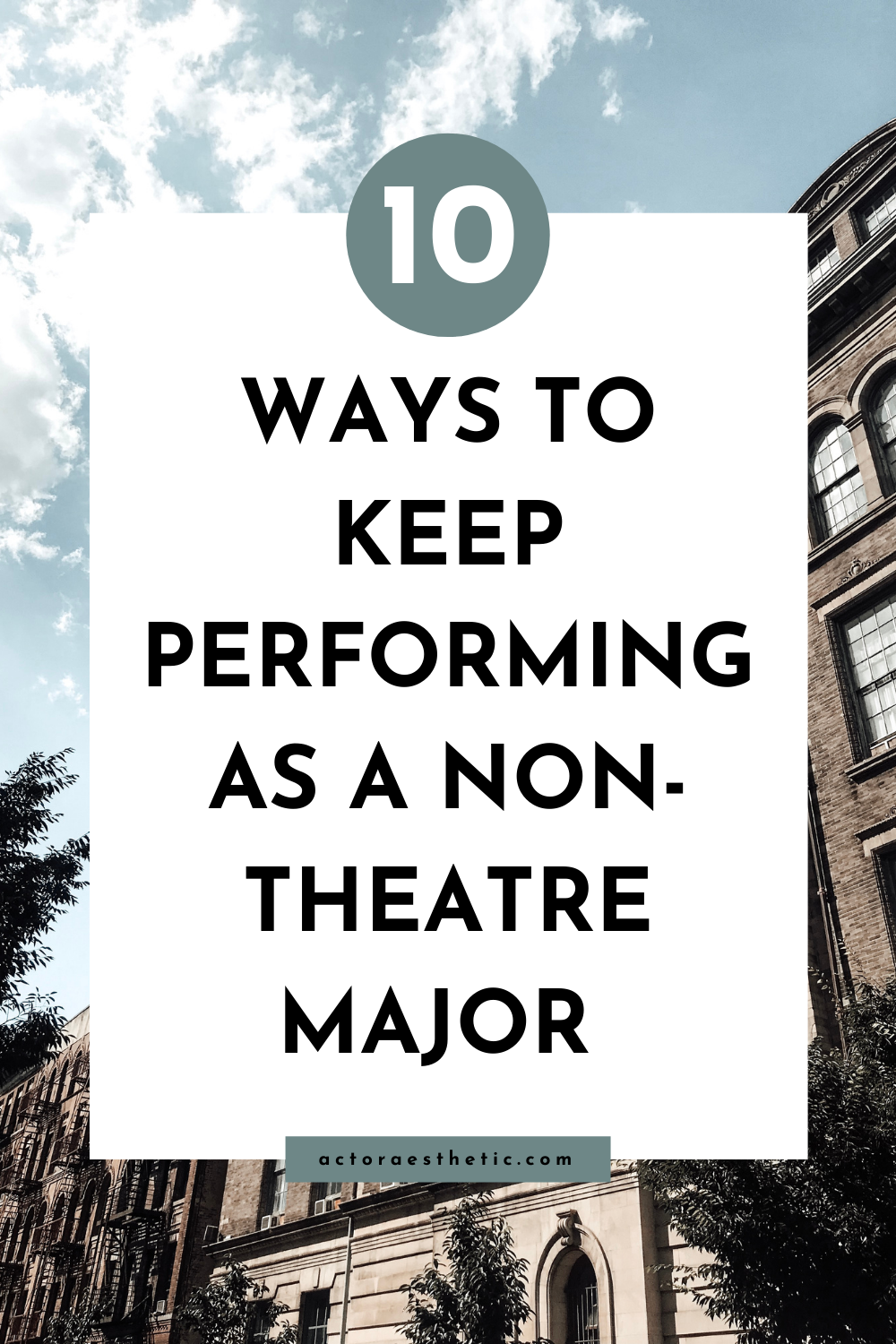10 Ways to Keep Performing in College as a Non-Performance Major
I have been performing since I was in diapers.
Throughout all of high school, I believed I would be going to college for musical theatre. Once junior year hit, my parents told me they would not financially support my desire to attend college for musical theatre. At first, I was devastated; eventually, however, I realized that you don’t need an MT degree to pursue musical theatre after high school. Currently, I am a freshman at Boston University pursuing a degree in speech pathology. Don’t get me wrong, I love my degree program, but the intensity of the program has made it difficult to double major in theatre.
Thus, I’ve had to get creative in how I continue my musical theatre training.
Here are some of the ways I’ve continued performing my first semester (while also living through a pandemic):
1. Minor: Most colleges across the country have theatre minors, but a lot of times majors are too intense to take up a minor. If you’re able to minor, do it! It’s a great way to collaborate with other students who may be majoring in theatre or other creative majors without 100% committing.
2. Join clubs and organizations: While this may seem obvious, joining clubs can be hard for some. Most universities have a plethora of clubs and organizations centered around theatre that does not require you to be in the theatre school. For example, at BU we have BU on Broadway (centered mainly around musical theatre), Stage Troupe (centered around plays), as well as clubs that focus on comedy, improv, Shakespeare, and more! Even during the pandemic, these organizations have worked tirelessly to create virtual performance opportunities to keep theatre alive during this wild time.
3. Become a student actor: This is probably the best way to focus on film and television acting! Colleges with film studies and directing programs are always looking for student actors. At BU, there’s a directory for theatre majors and non-majors to register as “talent” for directing professors as well as student directors to reach out to. This semester, I had the opportunity to be a student actor for a senior directing class (I was paid for this, which was a huge bonus). This put me in contact with student directors for later projects, and hopefully, when they make it big, they’ll reach back out!
4. Find local community theatres: Especially in big cities like Boston, Atlanta, and New Orleans, there are plenty of local theatres! Keep an eye out for jobs there, especially film jobs, as many productions are being filmed here as opposed to NYC or LA. These local theaters also hold workshops and classes throughout the year and often offer virtual classes and private lessons.
5. Participate in physical education classes: These are not your average PE classes. Don’t let the phrase “physical education” scare you: most colleges require a PE class, but even if they don’t require them, they most likely offer them. These classes are the best way to stay in shape and keep up with your dancing skills. Plenty of schools offer classes that range from Cardio Jazz Funk to Advanced Ballet. Oftentimes you can get credit for them!
6. Join an a capella group: Miss ensemble singing? A cappella is the perfect way to collaborate with other musically inclined peers as well as an opportunity to continually fine-tune your music reading abilities.
7. Find non-major classes: Even if you aren’t a major or minor in fine arts, plenty of colleges require a creative credit to fulfill general education requirements. Don’t just look at the theatre program; research vocal performance, technical production, dramatic literature, and dance minor classes in addition to looking into the MT and acting classes.
8. Stay in touch with your home theatre: You never know when your old director’s brother’s ex-wife’s dog’s mother’s son is looking for actors! Keep in touch with your high school directors and high school friends as you never know what projects may arise in your new hometown.
9. Find virtual workshops: This is one of the only good things to come out of the pandemic, in my opinion. You may be living in Wyoming, but nothing is stopping you from taking a virtual workshop with your favorite Broadway actor based in NYC. Always be on the lookout for these virtual workshops as they are the best way to collaborate with people all across the country who are often in the same boat as you.
10. TikTok: It created a Ratatouille musical, so what can’t it do at this rate? ! Keep an eye out for virtual opportunities to perform. You may feel a bit silly filming in your dorm room or bedroom, but practice is practice!
Caroline Goldman is from Atlanta, Georgia, and is currently studying Speech, Language, and Hearing Science at Boston University. Some of Caroline’s credits include: Once on this Island, Around Atlanta on $80, Addams Family, 25th Annual Putnam County Spelling Bee, Rent, and Avenue Q. She has studied musical theatre at Carnegie Mellon University’s pre-college program and has been studying voice and acting since she was four! Caroline hopes to inspire other actors to take a nonconventional approach to pursue theatre in college.













High schoolers - listen up! Here’s a general timeline to follow when preparing for musical theatre college auditions.